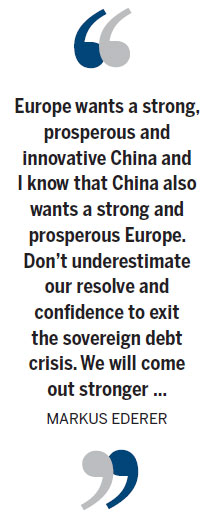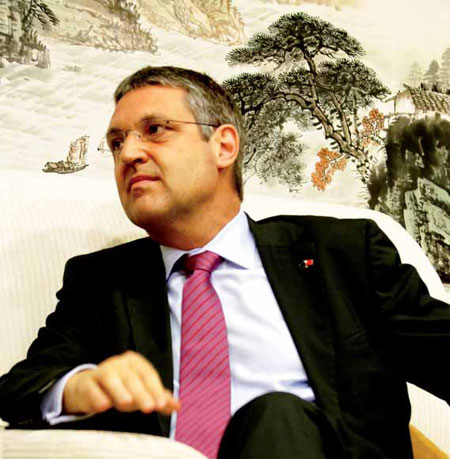Growing both ways
Updated: 2012-06-08 10:40
By Alexis Hooi (China Daily)
|
|||||||||||
|
Markus Ederer, head of the EU Delegation to China, says the new rail link connecting Chongqing in Southwest China and Duisburg, Germany, should help bring Europe and China closer. Xie songxin / China Daily |
Top EU envoy believes fortunes of East and West can rise together through southwestern megacity
Pessimism continues to grow in the East on the back of European economic woes but the head of the EU Delegation to China is confident that the West will overcome the crisis and fulfill expectations on both sides.
"Europe wants a strong, prosperous and innovative China and I know that China also wants a strong and prosperous Europe," Markus Ederer says.
"Don't underestimate our resolve and confidence to exit the sovereign debt crisis. We will come out stronger and I'm very gratified that Chinese leaders have more than once expressed confidence in the result."
Ederer, who was at last month's Liangjiang Forum in Chongqing to discuss the challenges and opportunities in western China, points to major ongoing projects in the southwestern megacity that will help push economic development on the two sides to that effect.
 |
The first is Chongqing's Liangjiang New Area, the only national development area in inland China and the third such area approved by the State Council after Shanghai's Pudong and Tianjin's Binhai in the north. The Liangjiang area is banking on features such as tax and business incentives, cheaper resources and utilities, urban and rural reforms, as well as major port and transportation projects to draw local and foreign enterprises to invest in the region. Liangjiang authorities say more than 100 Fortune 500 enterprises have already invested in more than 120 projects ranging from auto and banking to IT and telecommunications sectors in the area. The moves are expected to help spearhead the next stage of development by shifting the country's economic focus inland.
"The Liangjiang area is without doubt a remarkable program, which, by building an inland base for advanced and high-tech manufacturing industry and services, and by connecting it to the rest of China and the world, particularly Europe, will strengthen China's domestic market and boost domestic consumption," Ederer says.
"The government has made it advantageous to invest there. We can see the first successes by many computer producers relocating there. More than 250 European companies are now in Chongqing.
"We see companies from abroad, particularly European companies coming and I think they are mostly attracted by this huge untapped market in western China which has not fully benefited from China's economic miracle, by the expectation that Chinese society will move more toward domestic consumption and consumer goods," he says.
"The advantages have to be recognized by the companies. It's not so much politics but more of companies looking at viable solutions for their businesses. We put a lot of trust and expectation in the new area."
Ederer adds that the support from Chongqing authorities and assurances over its political stability following recent changes in its leadership are also a major factor promoting bilateral trade in the region.
"I had an exchange with Chong-qing's Party secretary (Zhang Dejiang) and I had a long talk with the mayor (Huang Qifan). We revisited what we had agreed upon last year such as bringing the European Union Chamber of Commerce to Chongqing. So many things are happening. The Party secretary has repeated that the policies for Chongqing will remain in place. The investor positions will remain stable. Maybe now after the changes there will be more from the policies of reform and opening-up. This is good news for European business," he says.
Zhang Dejiang, who is also vice-premier of the State Council, was appointed Party chief of Chongqing in March, replacing Bo Xilai. Bo is suspected of being involved in serious disciplinary violations.
All these are part of ongoing efforts by Chinese and European authorities and businesses to work together and build on their respective strengths and opportunities, Ederer says.
"It includes sustainable building, energy efficiency, mobility, water and waste management. This is a very broad field for European companies. So we want to share our experience with Chongqing," he says.
"For sustainable building, we know that 80 percent of the world's energy is used in cities and at the same time energy is very scarce. Eighty-percent of the world's CO2 emissions also occur in cities. So if we build cities in a sustainable way, such as insulated houses which do not use so much energy, if we develop mobility solutions which use less energy, if we save water, I think all these are areas where Europeans are very good and developed."
A major project that promises to boost economic cooperation and development between European and Chinese businesses is the new rail link connecting Chongqing to Duisburg, Germany. The railway, which passes through Kazakhstan, Russia, Belarus and Poland as well as the Chinese inland cities of Xi'an, Lanzhou and Urumqi, is part of the latest Eurasian Land Bridge concept, a continental rail link that includes Lianyungang Port in Jiangsu province with Rotterdam in the Netherlands and Antwerp in Belgium.
"It should help bring Europe and China closer together. As I understand, it will make the transportation of goods both ways cheaper," Ederer says.
"Europe and China are the biggest trading partners. Europe is China's biggest market for its goods. So any additional and more economical transport link will only add to this relationship. But it's not so much a matter of stimulating trade. We have the biggest trade relationship already. We trade more than 1 billion euros ($1.24 billion) a day. Last year, we traded more than 400 billion euros of goods. It's more Chinese exports, but the European trade is growing faster than the other way around. We are catching up. And there are a lot of goods which can be transported by rail such as luxury goods, machine tools and chemicals.
"So it's about making companies aware of this new opportunity and making this opportunity economically viable so that companies choose this route."
But Ederer agrees that there are still technical and administrative challenges that still need to be ironed out along the way.
"When you look at the route through Xinjiang, Kazakhstan and Russia, Russia has a different gauge and track. These are things we have to work on," he says.
There are also customs clearance and standardization issues for the goods to be transported.
"On the customs side, we have pretty much advanced because there is one customs certificate so you can send these goods through without any further control. But you cannot as easily exchange the gauges, such as through Russia, because Russia has a different system," he says.
"Europe has to recognize that there is a new link here. We should make it the topic for one of the next summits so that leaders take interest and give it the political push then things will develop faster. But at the end of the day we need to make the decision of whether to send the goods by rail or by ship because for them it's mostly a cost factor.
"On the European side we are against giving subsidies to particular ways of transportation or industries. It's up to businesses to decide how they want to ship their goods. This railway link has to make itself very attractive."
Taking all these in his stride, Ederer maintains that European and Chinese businesses have a lot in common. The increasing number of advantages offered by the growth of Chongqing and its leading position in China's western region already bode well.
"I am very optimistic. There is this very high dynamism. There is still a lot of developmental paths in this area so the potential is enormous."
alexishooi@chinadaily.com.cn
(China Daily 06/08/2012 page6)
Today's Top News
Rescuers race against time for quake victims
Telecom workers restore links
Coal mine blast kills 18 in Jilin
Intl scholarship puts China on the map
More bird flu patients discharged
Gold loses sheen, but still a safe bet
US 'turns blind eye to human rights'
Telecom workers restore links
Hot Topics
Lunar probe , China growth forecasts, Emission rules get tougher, China seen through 'colored lens', International board,
Editor's Picks

|

|

|

|

|

|






